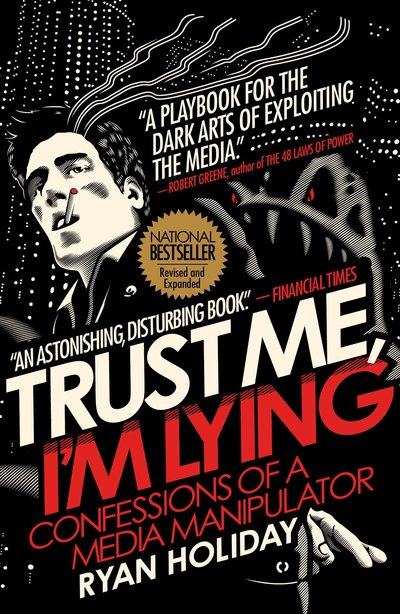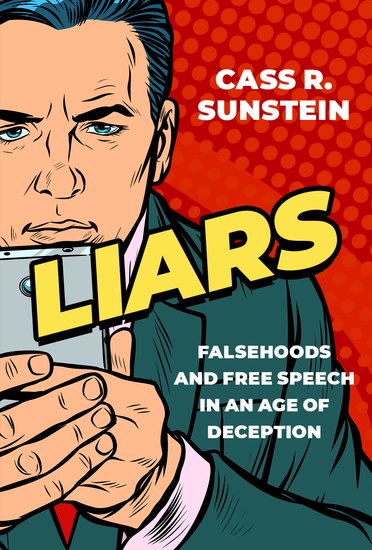I came across the book Trust Me, I’m Lying: Confessions of a Media Manipulator by Ryan Holiday after seeing a mention of another book, about the fall of Gawker, from the same author. I found the book really interesting. After having read it, I’m not really surprised I hadn’t hard heard of it before, since it paints the press is a really bad light. In the book the author discusses how he manipulated the media, particularly blogs, but did so in a way that media were seemingly willing participants in.
A lot of what you read these days isn’t true, there was this comical example mentioned in a later chapter of the book:
I once gave the show The Price is Right a five-hundred-dollar American Apparel gift card to use as a prize. We thought it’d be funny, since the show is television’s longest-running guilty pleasure. (Honestly, I was just excited as a fan.) The episode aired in September and was quickly posted by one of my employees on the company’s YouTube account. Everyone loved it and got the irony—a cool brand slumming it on a show only old people care about. Well, everyone got it except the popular advertising blog Brand Channel, which posted a nonironic piece titled “American Apparel Taps Drew Carey for Image Turnaround.” With excruciating obliviousness they proceeded to discuss the merits of my “surprising choice” to film a “back-to-school commercial, featuring a mock version of classic US game show The Price is Right hosted by an all-American TV personality Drew Carey. ”How does one begin to correct that?
Where would you even start? We’re not dealing with the same reality. If I had even known how to communicate to that idiot that Drew Carey was, in fact, the actual host of The Price Is Right, and that the video the blogger watched was a clip from an actual episode and not a commercial, I still would have to convince the writer to retract the entire thing, because an update couldn’t have fixed how wrong it was. Since I no longer foolishly hope for miracles, I didn’t even try to correct it, even as other blogs repeated the claims. I just had to sit there and watch as people believed something so stupid was true; the writer was wrong to the point of it actually working to their advantage.
That obviously is something wrong on a light-hearted topic, but it impacts much more serious issues and has the potential to seriously damage peoples’ lives.
A paragraph earlier the author says that journalists think addressing inaccuracy is everyone else’s responsibility:
I deal with people like him every day. Why do they get to be this way? They’re the ones who were wrong—and it was their job to be right, wasn’t it? Nope. Not according to their philosophy. Remember, the onus for pointing out inaccuracy falls on basically everybody but the person who gets paid to report facts for a living.
My experience has been slightly worse, as I seen journalists who take great umbrage that they should even be concerned about whether what they are saying is true at all.
In that environment, it is easy to take advantage of journalists. Something the author discusses doing, to help sell apparel, books, and movies tickets. He says he later realized that other people did that sort of things to push more significant agendas. The first part of the book discusses how he manipulated the media and the second addresses the problems with what is going on.
You can certainly look at the author as a bad guy here, but I didn’t. Anecdotes like this help me to have that view:
Once during a lawsuit I needed to get some information into the public discussion of it, so I dashed off a fake internal memo, printed it out, scanned it, and sent the file to a bunch of blogs as if I were an employee leaking a “memo we’d just gotten from our boss.” The same bloggers who were uninterested in the facts when I informed them directly gladly put up EXCLUSIVE! and LEAKED! posts about it. They could tell my side of the story because I told it to them in words they wanted to hear. More people saw it than ever would have had I issued an “official statement.”
He mentions another “leak” and then writes this:
The writer wrote back a helpful tip: No need to leak me info from your company e-mail address; you might get caught. I thought, but how else could she be sure they were real?
It was funny at the time. Then a few months later, a U.S. congressman allegedly exchanged e-mails with a girl on craigslist and sent her a shirtless photo of himself. The girl forwarded this photo and the incriminating e-mail correspondence that supposedly occurred along with them to Gawker (which owns Jezebel). Gawker posted it, and the congressman immediately resigned.
Knowing now that an anonymous tip to Gawker has the power to end the career of a United States congressman took a little of the fun out of it for me. Scratch that—now my personal knowledge of Gawker’s sourcing standards scares me shitless.
Other things done seem more problematic on the author’s part, but again the media doesn’t look great here:
I remember sitting on the couch at Tucker Max’s house one January a few years ago when something occurred to me about his then on-and-off-again bestseller. “Hey Tucker, did you notice your book made the New York Times list in 2006, 2007, and 2008?” (Meaning the book had appeared on the list at least once in all three years, not continuously.) So I typed it up, sourced it, and added it to Wikipedia, delineating each year. Not long after I posted it, a journalist cribbed my “research”and did us the big favor of having poor reading comprehension. He wrote: “Tucker Max’s book has spent over 3 years on the New York Times Bestseller List.” Then we took this and doubled up our citation on Wikipedia to use this new, more generous interpretation
Who’s The Fraud?
As if to highlight how bad the media is, when I did a Google site search for gawker.com for the book’s title, the first article that was listed was from a Gawker blog, Valleywag, from a couple years after the book was released. The post is titled “New York Observer Hires Known Fraud Ryan Holiday to Help Run Tech Blog”, the post’s author, Nitasha Tiku, makes the claim of fraud based on the book:
However, the reasons to question Holiday’s credibility as an editor are all there in the title of his book, where he describes tricking reporters for the financial benefits of his marketing clients. Holiday has also worked as the “media strategist” for two men of ill repute—Tucker Max and Dov Charney—best known for their misogynistic and legally murky actions and attitudes towards women.
They then wrote this:
In one of his columns for Betabeat, Holiday describes how he purposefully floated a fake number about the size of his book advance to reporters:
It went like this: I would grossly exaggerate the size of my book advance in a press release and let the gossip mill take this number and run with it. I would encourage bloggers and reporters to speculate that it was a celebrity tell-all about high-profile clients of mine like Dov Charney and Tucker Max. In effect, I’d be using the media’s weakness for sensationalism to get them to expose their weakness for sensationalism (and give coverage to my indictment of them, something they’d otherwise be reluctant to do).
It’s an odd take that this indicates that this guy is a fraud, and to ignore the other player in that.
Not really surprising based on that, the author of that post, Nitasha Tiku, is now a “tech culture writer”, for the Washington Post.
That situation though raises an obvious question, how much can you trust him to be telling the truth in the book. Some of this is easy enough to check out. Take this:
As I was gathering up press done on me personally over the years, I came across an article I’d forgotten. I’d posted a question on my blog: “What is the classic book of the ’80s and ’90s?” It was a discussion I’d had with several friends; we were wondering what book teachers would assign to students to learn about this era fifty years from now. This discussion was picked up and featured by Marginal Revolution, a blog by the economist Tyler Cowen, which does about fifty thousand pageviews a day.
Coming across this struck me not only because I am a big Tyler Cowen fan but because I am also Jeff Ritze. Or was, since that’s one of the fake names I used to use, and had apparently e-mailed my post as a tip to Marginal Revolution. Of course Jeff Ritze was thinking about Bret Easton Ellis—he’s one of my favorite authors. I even answered a variant of that question as me—Ryan Holiday—a few years later for a magazine that was interviewing me.
That post does exist, so clearly some of it is true.
The New Old Model Isn’t Working
A chapter of the book looks back on how the media has evolved, after the yellow press came the “modern stable press (by subscription)”, which he described as leading to more accurate reporting:
I don’t want to exaggerate. The transition to a stable press was by no means immediate, and it didn’t immediately transform the competition. But subscription did set forth new conditions in which the newspaper and the newspaperman had incentives more closely aligned with the needs of their readers. The end of that wave of journalism meant that papers were sold to readers by subscriptions,and all the ills of yellow journalism have swift repercussions in a subscription model: Readers who are misled unsubscribe; errors must be corrected in the following day’s issue; and the needs of the newsboys no longer drove the daily headlines.
A subscription model—whether it’s music or news—offers necessary subsidies to the nuance that is lacking in the kind of stories that flourish in one-off distribution. Opposing views can now be included. Uncertainty can be acknowledged. Humanity can be allowed. Since articles don’t have to spread on their own, but rather as part of the unit (the whole newspaper or album or collection),publishers do not need to exploit valence to drive single-use buyers.
While he notes that wasn’t immediate, that situation hasn’t played out so far, more recently. As the New York Times, despite having an apparently strongly growing digital subscriber base, continues to show much of a concern with their accuracy.
Trading Up The Chain
There are several takeaways you can have from this book. One, being wary of the media. Another is using the book as a guide to manipulate the media. Part of that is what he refers to as trading up the chain:
IN THE INTRODUCTION I EXPLAINED A SCAM I CALL “trading up the chain.” It’s a strategy Ideveloped that manipulates the media through recursion. I can turn nothing into something by placing astory with a small blog that has very low standards, which then becomes the source for a story by alarger blog, and that, in turn, for a story by larger media outlets. I create, to use the words of onemedia scholar, a “self-reinforcing news wave.” People like me do this everyday.
Again the media seems willingly involved in this:
Before you get upset at us, remember: We were only doing what Lindsay Robertson, a blogger from Videogum, Jezebel, and New York magazine’s Vulture blog, taught us to do. In a post explaining to publicists how they could better game bloggers like herself, Lindsay advised focusing “on a lower traffic tier with the (correct) understanding that these days, content filters up as much as it filters down, and often the smaller sites, with their ability to dig deeper into the [I]nternet and be more nimble, act as farm teams for the larger ones.”
Blogs have enormous influence over other blogs, making it possible to turn a post on a site with only a little traffic into posts on much bigger sites, if the latter happens to read the former. Blogs compete to get stories first, newspapers compete to “confirm” it, and then pundits compete for airtime to opine on it. The smaller sites legitimize the newsworthiness of the story for the sites with bigger audiences. Consecutively and concurrently, this pattern inherently distorts and exaggerates whatever they cover.
Related to that, I thought the author made this interesting point, about concern for accuracy and science:
One of my favorite books is Kathryn Schulz’s Being Wrong: Adventures in the Margin of Error. Though media mistakes are not the subject of the book, Schulz does do a good job of explaining why the media so regularly gets it wrong. Scientists, she says, replicate each other’s experiments in order to prove or disprove their findings. Conversely, journalists replicate one another’s conclusions and build on top of them—often when they are not correct.
The news has always been riddled with errors, because it is self-referential instead of self-critical. Mistakes don’t occur as isolated incidents but ripple through the news, sometimes with painful consequences. Because blogs and the media have become so interdependent and linked, a lapse of judgment or poor analysis in one place affects many places.
Science essentially pits the scientists against each other, each looking to disprove the work of others. This process strips out falsehoods, mistakes, and errors. Journalism has no such culture. Reporters look to one-up each other on the same subjects, often adding new scoops to existing stories. Meanwhile, people like Jeff Jarvis explicitly advise online newspapers and aspiring blogs not to waste their time trying “to replicate the work of other reporters.” In the age of the link, he says, “this is clearly inefficient and unnecessary.” Don’t waste “now-precious resources matching competitors stories” or checking and verifying them like a scientist would. Instead, pick up where they left off and see where the story takes you. Don’t be a perfectionist, he’s saying; join the link economy and delegate trust.
Irin Carmon
I would be remiss in not mentioning that a chapter of the book doesn’t paint a pretty picture of how the journalist Irin Carmon, who had a rapid rise and seems to have petered out in recent years, operates. You can read that chapter here. I also thought this line from that chapter is worth mentioning, to understand what is going on with journalists these days:
Writers like Irin Carmon are driven more by shrewd self-interest and disdain for the consequences than they are by jealousy.
Bottomline
Well worth a read.


